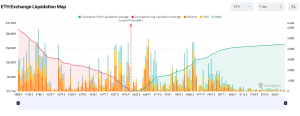In brief
Storm was found guilty of operating an unlicensed money transmitter.
The jury could not reach a verdict on money laundering and sanctions evasion charges.
Prosecutors have requested that Storm be remanded to prison, noting his connections to Russia.
A Manhattan jury found Roman Storm guilty of a conspiracy to operate an unlicensed money transmitter on Wednesday, just one of three chargers that the Tornado Cash developer faced.
The jury was unable to reach a decision on separate conspiracy to commit money laundering and conspiracy to commit sanctions evasions charges.
The jury was only able to reach the partial verdict after four days of deliberations. And as the case inched toward a hung jury, Judge Katherine Fallia issued an Allen charge, encouraging the New Yorkers to continue deliberating in hopes of coming into agreement on all charges, ultimately to no avail.
Storm was charged in 2023 with conspiracy to commit money laundering, conspiracy to commit sanctions violations, and conspiracy to operate an unlicensed money transmitting business.
The jury’s inability to agree on all charges, setting up a potential retrial, came nearly a week after prosecutors and Storm’s counsel presented closing arguments. The case could carry sweeping implications on developers’ ability to write open-source software while being free from fear of persecution, privacy advocates have argued.
Federal prosecutors asked that Storm be remanded to prison as the government weighs its next moves, citing his connections to Russia. As of 1 p.m. Eastern Time, federal prosecutors had not signaled whether they’d push for a retrial on two counts.
Storm’s attorneys argued during the three-week trial that Tornado cash wasn’t specifically built for hackers trying to cover their tracks on-chain, and that the protocol was merely meant as a tool for ordinary people to send and receive funds privately. The government dismissed that as a “cover story,” arguing that Storm sought to profit from “hiding dirty money for criminals.”
In some ways, the jury’s verdict was the culmination of a years-long government effort to crack down on coin mixers, which obscure the flow of digital funds by pooling funds with others.
Although the sanctions were later deemed unlawful, and subsequently lifted, the U.S. Treasury Department blacklisted Tornado Cash for Americans in August 2022. At the time, the government said $7 billion had been laundered through the protocol since its debut in 2019, with frequent use from the North Korean state-sponsored hacker organization Lazarus Group.
Over the past few weeks, jury members heard testimony from hackers and victims of scams. One witness testified that she lost $250,000 to a scammer that was laundered through Tornado Cash, but on-chain sleuths and Storm’s defense challenged that statement as faulty. Storm’s counsel also accused prosecutors of misrepresenting key Telegram messages.
Daily Debrief Newsletter
Start every day with the top news stories right now, plus original features, a podcast, videos and more.













